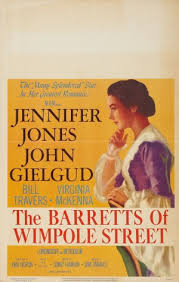
THE BARRETTS OF WIMPOLE STREET
UK, 1957, 105 minutes, Colour.
Jennifer Jones, Bill Travers, John Gielgud, Virginia Mc Kenna, Susan Stephen, Jean Anderson, Leslie Phillips.
Directed by Sidney Franklin.
The Barretts of Wimpole Street is based on a play by Rudolph Besier. It was adapted for the screen in 1934 and directed by Sidney Franklin. It had a very strong cast, Norma Shearer as Elizabeth Barrett, Fredric March as Robert Browning and, especially, Charles Laughton as Mr Barrett. Maureen O’Sullivan? was in the supporting cast.
Norma Shearer was nominated for an Oscar for this role (she had won an Oscar for The Divorcee in 1930). Fredric March had also won an Oscar for Dr Jekyll and Mr Hyde in 1932 and had appeared in such films as The Sign of the Cross. Charles Laughton had won an Oscar for The Private Life of Henry VIII and was soon to appear in Mutiny on the Bounty.
The film was criticised as being rather staid even though it looked lavish in its presentation of 19th century London.
Franklin had the opportunity to direct a widescreen colour version, using the screenplay from 1934. This time it was a British production with Jennifer Jones as Elizabeth Barrett and Bill Travers as Robert Browning (with his wife Virginia Mc Kenna as Henrietta). This time Mr Barrett is played with some subtlety by John Gielgud.
The second film is much more romantic than the first, with an English sensibility, especially in the cast, bringing to life the romance between the two poets under the eye of the disapproving father.
1. The impact of this story of a literary family and famous poets? Audience knowledge of Elizabeth Barrett and Robert Browning?
2. The re-creation of the Victorian period: costumes, décor, photography, musical score?
3. The literary style of the screenplay? Based on a play and opened out? How successfully – each version based on the same play and made by the same director with twenty years in between, the 30s film-making and the 50s?
4. The film as a romance, a tragedy? The place of women? Relationships within families – especially the psychology of a tyrannical and possessive father and the effect on his daughters?
5. What were the main characteristics of the Victorian atmosphere, the picture of family life, the relationship of brothers and sisters, the influence of the father, the norms for manners and behaviour, the clashes of will, the influences of power, the potential for suffering the need for rebellion? How stifling was the atmosphere? How well was this communicated?
6. How did the film successfully make Elizabeth central? Her relationship with her father, his dominance of her, the sequence on the drinking of port, Elizabeth as joyful central to her family, her relationship with Wilson, as ill, as pampered? Elizabeth as the poetess and her recitals of her poetry? The focus on the relationship between Elizabeth and Browning? by letter, in reality? The film having her reviving through her relationship with Browning? The change from fear to courage? The quality of her happiness and recovery? Her defiance? The power of love? The supporting of the brothers an and sisters? The goal of personal happiness? Was Elizabeth Barrett a convincing character and person of this film?
7. How important for the film and the impact was Mr Barrett? How did he embody the harsh aspects of the 19th century? His instilling of fear, pampering Elizabeth, making her better than she was, knowing all, his sour attitude to life, his harshness, his ruling his family, his blackmailing them emotionally, the length that he would go to keep his power? The effect of defiance on him? The importance of his revelation to Elizabeth about his hatred of marriage and love? (the contrast of emotion with his niece and the intensity of the kissing of his niece)? The effects of her decisions on him? His influencing Elizabeth to defy him? How sane was he? How moral?
8. The importance of Henrietta and the others, contrasting with Elizabeth? Lively people with squashed emotions, growing in love, needing support, yet fearful? The administering of the oath and Henrietta’s breaking it? The hatred for her father?
9. The portrait of 19th century servants, Wilson as a servant, faithful etc?
10. Comment on the way the film filled in the background of the family and the atmosphere, the cousins and the marriages, the doctors and their visits, walks and rides in the park?
11. What impact did Browning have in the film? As a forceful person like Barrett? Yet his humanity? A convincing poet? A man of forcefulness and charm? The good effects of his influence on Elizabeth?
12. How well did the film present insight into the family, love and hatred in family, power and domination, the destructiveness of selfishness?
13. What audience response to these themes did the film evoke? The emotional response of the audience in the area of freedom and obedience?
14. How enjoyable a film was this? How good a historical film? How important a thematic film of human life?